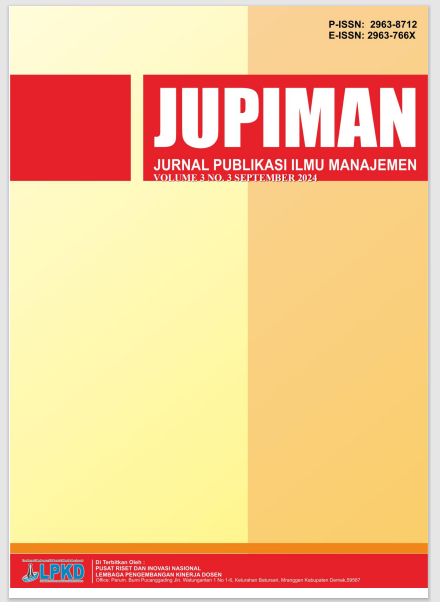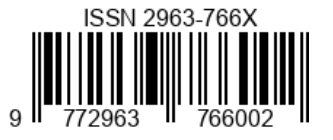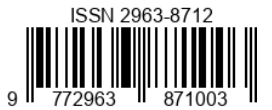Studi Kelayakan Usaha Minuman Jamu Kekinian
DOI:
https://doi.org/10.55606/jupiman.v3i4.4957Keywords:
contemporary jamu,, feasibility study, financial analysis, herbal drinks, MSMEsAbstract
This research aims to analyze the feasibility of herbal drinks or contemporary jamu business in the scale of Micro, Small, and Medium Enterprises (MSMEs) in Indonesia. The research method employs both quantitative and qualitative approaches with analysis of market, technical, management, legal, social, and financial aspects. The study results show that contemporary herbal drink businesses have significant market potential with relatively high return on investment, especially when marketed with appropriate branding and targeting millennial and Gen-Z market segments. Financial analysis indicates a payback period of 1.5 years with positive Net Present Value (NPV) and Internal Rate of Return (IRR) of 35%, exceeding the established discount rate. This research concludes that contemporary herbal/jamu drink businesses are feasible to operate as MSMEs by considering appropriate marketing strategies, sustainable product innovation, and compliance with applicable regulations..
Downloads
References
Andriati, A., & Wahjudi, R. M. T. (2016). Tingkat penerimaan penggunaan jamu sebagai alternatif penggunaan obat modern pada masyarakat ekonomi rendah-menengah dan atas. Masyarakat, Kebudayaan dan Politik, 29(3), 133-145.
Azmi, F., Simatupang, T. M., & Bakar, E. A. (2021). Financial feasibility analysis for small and medium enterprises: A practical approach for Indonesian entrepreneurs. International Journal of Business and Globalisation, 28(2), 221-237.
Bappenas. (2023). Perkembangan UMKM dan usaha besar (UB) tahun 2018-2022. Badan Perencanaan Pembangunan Nasional.
Cahyadi, A., & Widyastuti, S. (2022). Motivasi konsumsi minuman herbal di kalangan milenial dan Gen-Z. Jurnal Manajemen Pemasaran, 16(2), 88-102.
Creswell, J. W., & Creswell, J. D. (2018). Research design: Qualitative, quantitative, and mixed methods approaches (5th ed.). SAGE Publications.
Elfahmi, E., Woerdenbag, H. J., & Kayser, O. (2014). Jamu: Indonesian traditional herbal medicine towards rational phytopharmacological use. Journal of Herbal Medicine, 4(2), 51-73. https://doi.org/10.1016/j.hermed.2014.01.002
Fadhilah, A., Suharyono, S., & Mawardi, M. K. (2019). Tren minuman herbal di kalangan milenial Indonesia. Jurnal Administrasi Bisnis, 72(1), 114-123.
Hasan, M., & Islam, M. S. (2020). Determining factors of entrepreneurial success: Evidence from SMEs in emerging economies. International Journal of Small Business and Entrepreneurship Research, 8(3), 1-15.
Husnan, S., & Muhammad, S. (2014). Studi kelayakan proyek bisnis (5th ed.). UPP STIM YKPN.
Kasmir, & Jakfar. (2015). Studi kelayakan bisnis (Edisi revisi). Prenadamedia Group.
Khan, M. A., Rahman, M. M., Sardar, M. S., Araya-Ajoy, Y. G., & Faruque, M. O. (2022). Global trends in herbal medicine and nutraceuticals: Market analysis and future prospects. Journal of Ethnopharmacology, 290, 115012. https://doi.org/10.1016/j.jep.2022.115012
Mathews, J. A., Rodriguez, H. P., & Thompson, M. C. (2022). Financial viability of plant-based food and beverage startups in Asia: Challenges and opportunities. International Journal of Entrepreneurial Finance, 24(3), 345-367.
Nguyen, T. T., Nguyen, H. V., & Nguyen, T. N. (2023). Growth dynamics of small and medium enterprises in food and beverage sector: A comparative analysis. Journal of Small Business Management, 61(1), 156-178. https://doi.org/10.1080/00472778.2022.2141022
Phan, X. T., Nguyen, T. D., & Le, A. N. H. (2022). Consumer preferences for traditional herbal drinks in Southeast Asia: Marketing implications for cultural product modernization. Journal of Food Products Marketing, 28(1), 24-41. https://doi.org/10.1080/10454446.2021.1955454
Pratiwi, A., & Pribadi, P. (2020). Jamu sebagai warisan budaya dan potensi ekonomi kreatif Indonesia. Jurnal Pariwisata dan Budaya, 11(2), 67-78.
Rivera, J. J., Ruiz, N. M., & Martínez, C. E. (2021). Small business failure: The importance of comprehensive feasibility studies. International Journal of Entrepreneurial Behavior & Research, 27(4), 923-944. https://doi.org/10.1108/IJEBR-04-2020-0214
Saputra, A. D., & Munandar, J. M. (2021). Analisis kelayakan finansial usaha minuman herbal di Indonesia. Jurnal Aplikasi Bisnis dan Manajemen, 7(2), 384-395.
Sharma, P., & Kumar, V. (2023). Beyond health benefits: The experiential value of herbal products among modern consumers. Journal of Consumer Behaviour, 22(1), 78-93. https://doi.org/10.1002/cb.2057
Suharmiati, S., & Handayani, L. (2018). Tanaman obat dan ramuan tradisional untuk mengatasi demam berdarah dengue. Jurnal Penelitian dan Pengembangan Pelayanan Kesehatan, 2(1), 43-50.
Tambunan, T. (2017). UMKM di Indonesia. Ghalia Indonesia.
Umar, H. (2015). Studi kelayakan bisnis (3rd ed.). Gramedia Pustaka Utama.
Wijaya, S. A., & Rahayu, W. P. (2021). Jamu kekinian: Transformasi minuman herbal tradisional Indonesia di era modern. Jurnal Pangan dan Agroindustri, 9(3), 201-212.
Downloads
Published
How to Cite
Issue
Section
License
Copyright (c) 2024 Jurnal Publikasi Ilmu Manajemen

This work is licensed under a Creative Commons Attribution-ShareAlike 4.0 International License.








